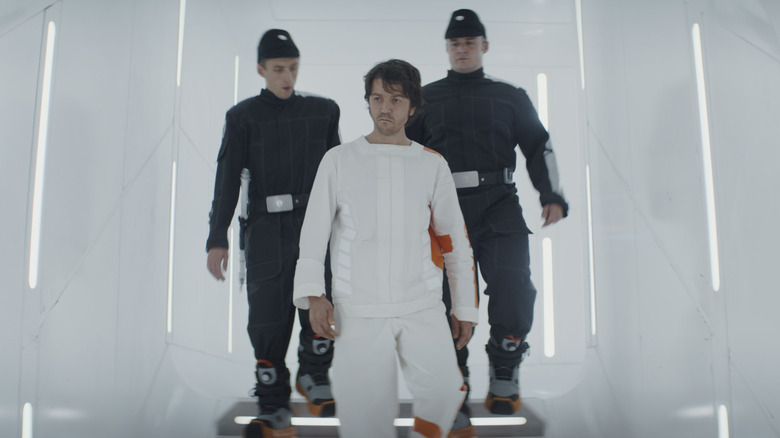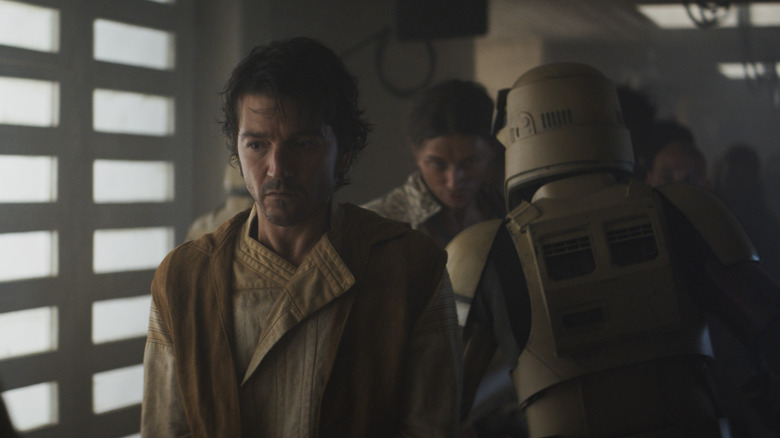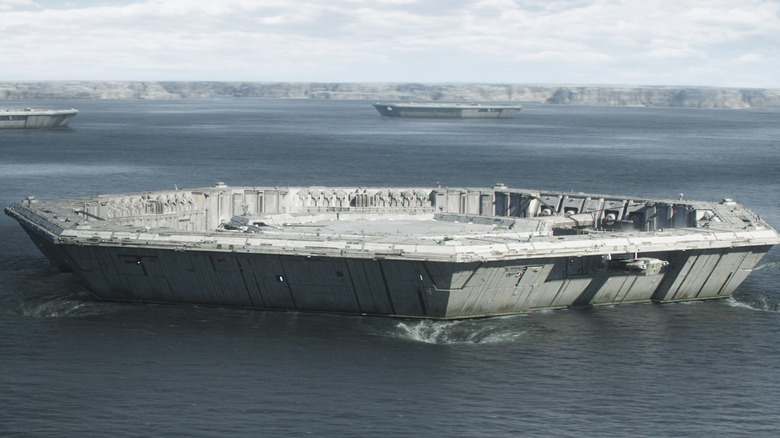Andor Writer And Executive Producer On Making A Grown-Up Star Wars Show [Exclusive Interview]
Ask anyone involved with "Andor" about the main reason behind the show's creative success and inevitably, the first thing they'll point to is the vision of creator Tony Gilroy. Brought on board to help bring "Rogue One: A Star Wars Story" across the finish line back in 2016, the filmmaker behind "Michael Clayton" and the scripts of the "Bourne" trilogy proved impressive enough to bring back for another go-around on the "Star Wars" carousel with the spin-off series based on Cassian Andor (Diego Luna).
The results of handing the creative reins for "Andor" over to Gilroy has been pretty self-evident. Judging from the critical response to the rather un-"Star Wars"-like production (you can check out /Film's Vanessa Armstrong's review here), such a creative shake-up was exactly what this franchise needed. Part of that shake-up involved turning up the violence, the adult situations, and proposing some pretty anti-authoritarian politics for a franchise that — under Disney's guidance, at least — has seemed content to play things somewhat more safe.
In a recent interview, "Andor" writer Beau Willimon and executive producer Sanne Wohlenberg were both effusive in their praise for Gilroy's efforts in dictating much of the direction for this series. With Willimon placed in charge of scripting the fine details of the prison arc in episodes 8-10, I had the chance to pick his and Wohlenberg's brains about crafting a more adult-skewing "Star Wars" story, how these prison episodes came together, the effect these circumstances had on Cassian's arc, and more.
'We were just trying to do a character-based story that felt true'
This interview has been lightly edited for clarity and brevity.
I think most people would agree that "Andor" is a very, very different type of "Star Wars" story than maybe what we've expected or what fans were used to before. Was the idea of making this show a little more adult-skewing than perhaps other shows have been, was that baked into the concept already? Or was that something that either of you pushed for?
Willimon: All starts with Tony Gilroy. He had a clear vision for the show, walked into the room with the 80-page bible and a lot of what he wanted to do with the first season, and a general approach for the whole show. He wanted to tell a human story, he wanted to tell a story at the ground level, ordinary people that we can relate to, put in extraordinary circumstances, and becoming extraordinary in the process. So whether that's more adult-skewing or not was sort of beside the point. If it feels more adult, that's, I guess, in the eye of the beholder. But really, he wanted to do an emotionally compelling, sophisticated look at flawed people trying to tackle something that is seemingly impossible. And what does that look like and feel like, and how do you tell a rip-roaring yarn along the way?
At any point during production on this show, did you ever feel like you were pulling off a little heist of your own, sneaking in these sort of anti-capitalist messages within this massive studio system?
Willimon: Your words, not ours. It's a work of fiction, and so first and foremost, we're just trying to tell a good story. Now, people have interpreted "Star Wars" in all its iterations in any number of ways going back to the year I was born, 1977. And I think it's a credit to George Lucas and everyone that's worked on "Star Wars" stories since that it's such a vast world open to interpretation that you can have a lot of interesting and healthy discussions stemming from the storytelling.
Obviously, all writers, all production designers, all actors, all producers are bringing something to the table in terms of their lived experience and in terms of history and the world around us. But we weren't trying to pull a fast one on anyone here, we were just trying to do a character-based story that felt true. And it happens to be a story about rebellion. And then asking the questions of, "How do you become a rebel, and what sacrifices are you willing to make to achieve what you're trying to achieve?" And when you're going to tell a story like that, naturally, I think, people might want to interpret it in certain ways or compare it to certain things and that's entirely up to the audience and people writing about the show. It's more interesting to hear what the audience and journalists have to say that it is anything we might have to comment on.
What made "Andor" a story that you wanted to dedicate so much time to? You've been working on this for what, two or three years at this point?
Wohlenberg: Yeah [laughs]. I mean, the very simple answer is Tony Gilroy, really. He's an extraordinary writer and an inspirational creator. And the idea of getting involved and being a part of him bringing a new series as part of the "Star Wars" franchise, a prequel to "Rogue One" with Cassian Andor at the heart of it to the screen, was just a really exciting one. It always starts with a strong vision and good writing, and that really was what drew me to it immediately. Of course, "Star Wars" is a much-loved franchise, too, and to get a chance to be part of that at the same time is just a really exciting proposition, and a surprising and wonderful opportunity to come my way.
'What it's like to be under the boot of the Empire'
This first season of "Andor" can essentially be split into three or four little groupings of episodes based on the pairings of who's writing and who's directing. Beau, obviously you had the prison arc. How were those writing responsibilities delegated? What did you want to say with these specific episodes that maybe you couldn't have with others?
Willimon: Tony had a decent sense of what he wanted the structure of the season to be from the get-go. So we knew there was going to be a prison portion. We didn't know who was going to write what yet until the end of the room, and then Tony assigned episodes and I was very pleased that I was going to be able to tackle the prison side of things. The prison itself developed in the room as — there's practical considerations of, "What does this prison look like? How do we make it different than every other prison you've seen before? What is a prison — if you want to get rid of bars and guards, what do you do? I don't know, maybe an electric floor. Where is this prison? Maybe it's on a planet where it's like a kind of Alcatraz Island, but we don't want to just do an island. Maybe it goes into the lake as opposed to being above it."
So you start with things like that, but you're then also asking yourself, thematically, what are you trying to do? This is a part of the story where Cassian, who did [participate in the heist on] Aldhani, but really just wanted to take the money and run, and he's brushed up against the rebellion. We want him to really feel what it's like to be under the boot of the Empire in a serious way, for a sustained and ostensibly inescapable way. So what you're trying to do, I think, is move him towards becoming a Rebel and flip the tables.
If he was being recruited by [Stellan Skarsgård's character] Luthen at the beginning of the season, in this arc, he actually has to become the recruiter. He's the Luthen, of sorts. And [Andy Serkis's character] Kino's journey during the course of that is a part for the whole of the larger story: How do you become a Rebel? Over three episodes, we go [from] Kino being complicit in facilitating the oppression of the Empire to being the guy who's leading the charge in the escape. That's a shorter version of what Andor's journey will be all the way up to "Rogue One."
Did this storyline originate from just everybody contributing ideas or was that maybe something ... which parts did you personally contribute that fans might not know about?
Wohlenberg: It all starts with Tony's outline. He really had a very strong idea of the overall arc of the series that he was wanting to tell, and the prison being part of it, and Cassian, at this moment, being incarcerated and feeling the full force of the Empire almost in an inescapable way was, really, that was all on the table. We, all together then, in the room, really just kind of contextualized the prison and made it something fresh for the world of "Star Wars." I think that was a huge collaboration and a really exciting kind of journey to go on. And the room was almost, the best idea wins. Because when Tony works with [Dan Gilroy] and Beau there is a huge trust, and kind of a long-standing relationship, and a real ease. Our designer, Luke Hull, was part of it, too. And it is just a really exciting process, but it's really fleshing out something that Tony brings to the table from the start.
New episodes of "Andor" air on Disney+ on Wednesdays.


